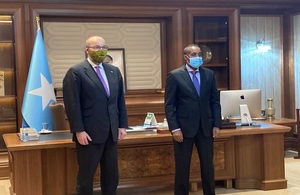With your permission, Mr Speaker, I would like to update the House, and the people of Northern Ireland, on the implementation of the Northern Ireland Protocol as part of the Withdrawal Agreement with the European Union.
Throughout 2020 we have worked intensively to ensure that the Withdrawal Agreement, in particular the Northern Ireland Protocol, will be fully operational on 1 January 2021.
Our aims, and the proportionate and pragmatic way we intended to pursue them, were set out in the Command Paper we published in May, ‘The UK’s approach to the Northern Ireland Protocol’ .
This set three key commitments that we believe needed to be respected in all scenarios:
We had to ensure that Northern Ireland businesses retained unfettered access to the rest of the UK market.
Northern Ireland’s place in the UK’s customs territory had to be protected – and that meant that goods that stayed in the UK were not subject to tariffs.
And we had to ensure that the important GB-NI trade flows, on which lives and livelihoods depend, were not disrupted; and we need to ensure a smooth flow of trade, with no need for new physical customs infrastructure.
And Mr Speaker, I am pleased to say that on Monday the European Commission Vice President Maroš Šefčovič and I – as co-chairs of the Joint Committee set up to negotiate the implementation of the protocol – came to an agreement in principle on a deal which meets all of those commitments, and puts the people of Northern Ireland first.
I would like to begin by paying tribute to Maroš and his team for their pragmatism, their collaborative spirit – and their determination to get a deal done that would work for both sides. And I’d also like to thank the first minister, the deputy first minister and all the members of the Northern Ireland executive for their crucial intervention at significant moments in order to ensure that the rights of the people of Northern Ireland were protected.
Turning now to that first Government commitment, the deal protects unfettered access for Northern Ireland businesses to their most important market.
As the Prime Minister underlined, this had to be protected in full – and that meant removing any prospect of export declarations for Northern Ireland goods moving from Northern Ireland to Great Britain.
And that’s what our agreement will do. There will be no additional requirements will be placed on Northern Ireland businesses for these movements, with the very limited and specific exception of trade in endangered species and conflict diamonds.
On the second commitment, Mr Speaker, the deal safeguards Northern Ireland’s place in the UK’s customs territory.
As recently as July, the Commission had envisaged a default tariffs scenario in which, and I quote:
all goods brought into Northern Ireland [would be] considered to be at risk …and are as such subject to the Common Customs Tariff.”
If that had been implemented that would have raised the prospect of a 58% tariff on a pint of milk going from Scotland to a supermarket in Strabane or 96% on a bag of sugar going from Liverpool to the shops of Belfast.
As we’ve repeatedly made clear, this could never have been an acceptable outcome.
So instead, I am pleased to say that under the agreement that we’ve reached, Northern Ireland businesses selling to consumers or using goods in Northern Ireland will be free of all tariffs.
Whether that is Nissan’s cars from Sunderland; or lamb from Montgomeryshire.
Internal UK trade will be protected as we promised – whether we have a Free Trade Agreement with the EU or not.
And third, Mr Speaker, this deal would keep goods flowing between Great Britain and Northern Ireland in January, and indeed provide some necessary additional flexibilities.
It protects Northern Ireland supermarket supplies. We heard throughout the year that traders needed time to adapt their systems.
That is why we have a grace period for supermarkets to update their procedures.
And our agreement also prevents any disruption at the end of the transition period on the movements of chilled meats. British sausages will continue to make their way to Belfast and Ballymena in the new year. And we have also got time for reciprocal agreements between the UK and EU on agri food to be discussed in the months ahead.
This deal also protects the flow of medicines and vet medicines into Northern Ireland. This means we’ll grant industry a period of up to 12 months to adapt to the rules under the protocol – so this will avoid any disruption to critical medical supplies.
So three commitments entered into, three commitments that we have upheld.
But this agreement in principle also goes further still, providing additional flexibility that will enable us to make the most of the opportunities that face us as the transition period ends.
As you know, Mr Speaker, this House has been concerned about the risk of so-called ‘reach back’ from the state aid provisions that the Protocol applies.
The concern that many colleagues had was that a company in Great Britain, with only a peripheral link to commercial operations in Northern Ireland, could be caught inadvertently by the tests within the Protocol’s text.
That would not have been acceptable; nor was it what the Protocol had envisaged.
That is why I am pleased that the agreement we have addresses that risk.
It means firms in GB stay outside state aid rules where there is no ‘genuine and direct’ link to Northern Ireland, and no ‘real foreseeable’ impact on NI-EU trade. It’s an important step forward, dealing with an issue raised by a number of honourable and right honourable members across this House.
Also, this deal ensures that Northern Ireland will be out of the Common Agricultural Policy, which means that the Northern Ireland Executive have full freedom to set their own agricultural subsidies for Northern Ireland’s farmers.
It also means appropriate and flexible arrangements which mean that more than £400m of spending each year is totally exempt from state aid rules. As well as this, the deal ensures that support for fishermen in Northern Ireland will also be exempt from EU state aid rules – and that means more than £15m of flexibilities for Northern Ireland’s fishermen over the next five years. And of course Northern Ireland’s services industries are totally outside the scope of the Protocol and its state aid measures.
The agreement also respects the Protocol provisions, which were endorsed by Parliament, that allow some EU officials to be present at Northern Ireland ports as UK authorities carry out our own procedures.
And let me be clear, there will be no Belfast ‘mini-embassy’ or mission, as the EU originally sought. And the EU officials will not have any powers to carry out checks themselves.
There will instead be sensible practical arrangements, cooperation,reciprocal data-sharing, so that both sides can have confidence in these unique arrangements.
We also want to leave no doubt about our ongoing commitments to peace and prosperity in Northern Ireland.
My Right Honourable Friend the Northern Ireland Secretary will set out, in the coming days, further measures of financial support, to help businesses and communities to prosper and thrive from the end of the year and beyond.
And Mr Speaker, we’ve been able to deliver a package which now means that the Protocol can be implemented in a pragmatic and a proportionate way. It takes account of the Belfast (Good Friday) Agreement in all of its dimensions, and it protects the interests both of the EU single-market but more importantly, the territorial and constitutional integrity of the whole United Kingdom.
Now, this agreement will be approved officially at a Joint Committee meeting in the coming days.
And, of course this agreement that we have reached also enables the Government to withdraw clauses 44, 45 and 47 of the UK Internal Market Bill, and avoids the need for any additional provisions in the Taxation Bill.
Having put beyond doubt the primacy of the sovereignty of this place, as we leave the EU, we rest safe in the knowledge that such provisions are no longer required.
We know that we now need to get on and give further clarity to business as to the specifics of what this deal means for them, and how it will all work in detail in practice. And we will do this through the publication of further guidance.
And that will sit along the ongoing, intensive work we will take forward to implement the Protocol
But above all, Mr Speaker, we will always work with the interests of the people and businesses of Northern Ireland in mind – as this agreement, and the important flexibilities it will provide, reflects.
Because we must all remember if the Protocol is to work, it must work for the whole community in Northern Ireland. And whether it is to be maintained in the future, as the Protocol itself sets out, is for the people of Northern Ireland to decide through the democratic consent mechanism that my Rt Hon Friend the Prime Minister negotiated.
And on that critical, important note of the primacy of democracy, I recommend this statement to the House.

